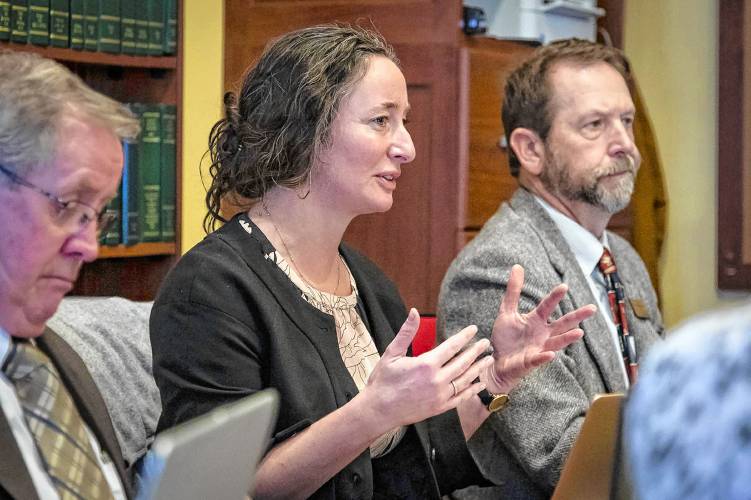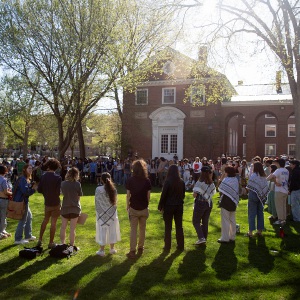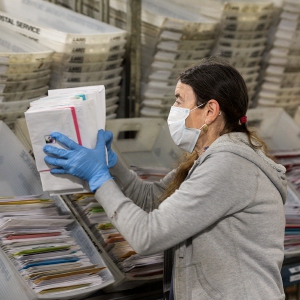Editorial: Taxing Vermont’s wealth

Rep. Emilie Kornheiser, D-Brattleboro, chair of the House Ways and Means Committee, speaks during a committee meeting at the Statehouse in Montpelier, Vt., in January 2024. (VtDigger - Glenn Russell) —
|
Published: 02-02-2024 9:00 PM
Modified: 02-05-2024 9:53 AM |
Polls show that large majorities of Americans sense that the wealthiest members of society are not paying their fair share. That perception reflects reality: With income inequality hovering near historic highs, the poorest 20% of taxpayers are burdened with effective tax rates nearly 60% higher than the top 1% of households, according to the nonpartisan Institute on Taxation and Economic Policy.
Given that Vermont is a progressive haven as well as home to Bernie Sanders, it is hardly surprising that two bills pending in the Vermont Legislature would enact a “wealth tax” to more fairly distribute the costs of providing government services. Both plans are sponsored by state Rep. Emilie Kornheiser, D-Brattleboro, who chairs the Ways and Means Committee, which suggests that the Legislature’s overwhelming Democratic majority views this as a high priority.
One proposal would impose a 3% tax surcharge on the 2% of Vermonters with federal adjusted gross income of $500,000 or more. According to supporters, the surcharge would yield nearly $98 million a year in revenue.
The other bill pursues the same goal in a different and far more complex way. It would tax people with more than $10 million in net worth on their unrealized capital gains. Kornheiser gave The New York Times an example of how it would work: Someone with assets worth $10 million at the beginning of the tax year and $11 million at the end of it would have that $1 million in unrealized gains counted as income subject to Vermont’s highest income tax rate of 8.75% — even though those gains would all be on paper.
That proposal addresses the reality that wealth constitutes far more than regular income. Generally speaking, wealth taxes apply to the net full market value of a variety of asset classes such as cash, bank deposits, stocks, fixed assets, real property, artwork, vehicles and trusts. Both Sanders and Sen. Elizabeth Warren, D-Mass., have proposed wealth taxes in recent years to address the increasingly stark disparity of wealth in the United States. With those proposals going nowhere in Congress, Vermont is among 10 states this year that are at least considering a state version.
The complaint that Vermont’s many “trust-funders” do not do their part has been heard for many years. A wealth tax as a measure promoting greater economic and social equity has much to recommend it, especially because great wealth also often confers outsized political influence. But there are arguments against it that also must be considered. One was raised by Gov. Phil Scott, who suggested that wealthy people might simply move away from Vermont if the tax burden becomes too high. Kornheiser counters that Vermont is experiencing an influx of wealthy newcomers for whom the state’s attractions are far more important than the imposition of such a tax. We agree with Kornheiser, especially because the tax would have little impact on the lifestyle of those paying it. But Scott’s objection cannot be dismissed out of hand.
We also note that the bill to impose the 3% surcharge on incomes over $500,000 is so straightforward that it is only two pages long. The net worth version, on the other hand, is 39 pages long and contains language sufficiently complex that it might constitute a tax-attorney employment act. Tax avoidance, if not evasion, is an art form mastered by many wealthy families. Does the state Tax Department have sufficient resources to enforce such a law, or even to accurately value the assets subject to the tax? It is a question worth pursuing.
Another argument against wealth taxes is that they discourage investment, to the detriment of job creation and economic growth. We tend to discount that argument on the grounds that a fair return on an investment need not hinge on whether the last dollar can be wrung out of it.
Article continues after...
Yesterday's Most Read Articles
 Dartmouth administration faces fierce criticism over protest arrests
Dartmouth administration faces fierce criticism over protest arrests
 West Lebanon crash
West Lebanon crash
 Plan on track to ship Upper Valley mail to Connecticut for sorting
Plan on track to ship Upper Valley mail to Connecticut for sorting
 Lebanon’s Jewell back from auto accident, more aware of ‘drowsy driving’ dangers
Lebanon’s Jewell back from auto accident, more aware of ‘drowsy driving’ dangers
 Longtime employees buy West Lebanon pizzeria
Longtime employees buy West Lebanon pizzeria
We bring up opposing arguments not only to debate their merits but also because many rank-and-file Vermont taxpayers surely will be skeptical when they hear the words “wealth tax,” not least because what constitutes wealth is often in the eye of the beholder. And no doubt interest groups opposed to the idea will not hesitate to sow confusion. Supporters need to make their case beyond the halls of the Statehouse, at the grassroots level.
It also occurs to us that the way to make the strongest possible case for the wealthy paying their fair share would be to dedicate the revenue reaped from a wealth tax to addressing a particularly pressing need — such as housing or child care. That would establish a clear and convincing link between the tax and a societal good, as envisioned in the Vermont Constitution.

 Editorial: Response to campus protests only adds fuel to the fire
Editorial: Response to campus protests only adds fuel to the fire Editorial: Chris Sununu’s moral vacuum
Editorial: Chris Sununu’s moral vacuum Editorial: Gambling tarnishes America’s sporting life
Editorial: Gambling tarnishes America’s sporting life By the Way: A white nationalist’s many mistruths
By the Way: A white nationalist’s many mistruths
